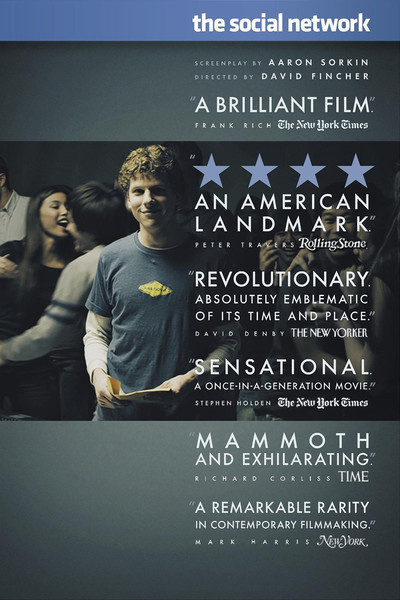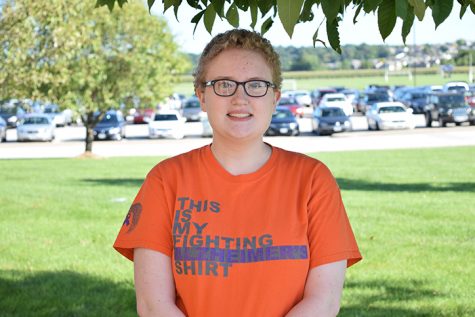The price of creativity: the lasting power of “The Social Network”
April 24, 2017
When David Fincher’s “The Social Network” came out way back in 2010, I was a mere 11 years old. As a result, I had neither the attention span necessary to watch it nor the life experience needed to understand what it was trying to say. I knew that it was about the creation of Facebook and that was pretty much all I did know for a while.
I have seen bits and pieces of the film over the years, during some of the instances it is on cable. But it wasn’t until a week ago that I actually watched it all the way through. In the span of the following week I have watched it five times. Each time I watched it I enjoyed it even more, to the point where I could say it’s probably my new favorite movie. This is a brilliant, perfectly calibrated and sharp movie, a movie that even seven years later, after all the drama about Facebook has died down, still has lots and lots to say.
Creativity is not limited to things like art and music. Creativity can also come in the form of a drunk Harvard student blogging about his ex-girlfriend at two in the morning. This is our introduction to Mark Zuckerberg (played by Jesse Eisenberg in an Oscar-worthy performance), in the fall of 2003. In his alcohol-fueled bitterness, Mark creates the website Facemash, which allows Harvard students to rate fellow female undergrads based on how attractive they are. Even if what he is doing is incredibly mean and inconsiderate, Mark does it in swift and impressive fashion.
Although Mark is punished by the school’s administrative board and is given a few months of academic probation, his work catches the attention of upperclassmen, athletic twins Cameron and Tyler Winklevoss (the forever underrated Armie Hammer in a dual role), and their business partner Divya Narendra (Max Minghella). They pitch Mark the idea of Harvard Connection, a site for Harvard students aimed at being something like a dating site. Mark agrees to design the site for them.
However, Mark soon turns to his good friend Eduardo Saverin (Andrew Garfield) with his own idea for a website. A website that will become Facebook, meant to help people get in touch with others they may not be able to contact elsewhere. Once the website goes up, the Winklevosses and Narendra get the idea that Mark stole their idea and marketed it as his own, but they struggle to find the correct course of action in how to deal with it, both legally and otherwise.
Whether Mark actually stole his idea for Facebook from the Winklevoss twins is beside the point. I think Mark settles the dispute pretty well with the line “Every guy who’s built a nice chair doesn’t owe money to everyone who’s ever built a chair”. The point is that Mark’s decision to put his own form of creativity out into the world costs him dearly. He is pursued by the angry Winklevosses. He struggles to reconnect with his ex Erica (Rooney Mara) who is still burned by his angry blog posts about her after their break-up. His friendship with Eduardo begins to crumble when a wild card arrives in the form of Napster founder Sean Parker (Justin Timberlake).
The way this all plays out is keen and intense, due to the beautiful combination of Fincher’s direction and Aaron Sorkin’s screenplay. Sorkin, best known for writing the TV show “The West Wing”, is best at witty and sharp dialogue, and “The Social Network” is a often a very funny yet scathing movie as a result of the coupling between Fincher and Sorkin. The icing on the cake is the fantastic soundtrack by Trent Reznor and Atticus Ross, who would go on to score Fincher’s next two films, “The Girl with the Dragon Tattoo” and “Gone Girl”. The best piece of music is “Hand Covers Bruise”, which is used at three separate points in the film and serves as Mark’s leitmotif. An eerie electronic drone with the sporadic use of a few haunting piano notes, “Hand Covers Bruise” symbolizes the best of the film: simple on the surface but searing in execution.
None of the dialogue and emotional beats of the film would work without the performances of the actors, and almost every single actor is at the top of their game. Eisenberg, Garfield and Hammer have all gone on to have very successful careers, and their success can be traced back to this film. Eisenberg is nearly perfect, making Mark a person who, at least in my own opinion, is easy to both hate and like immensely. His mannerisms and the way he speaks is perfectly planned out but he never comes off as phony. We understand his anger and his actions even if we don’t agree with it ourselves. Garfield gives a volcano of a performance. We watch was Eduardo slowly and slowly reaches his breaking point and our hearts hurt for him when he finally explodes. Hammer is an actor who I have always enjoyed and appreciated. He always brings a large amount of earnestness to his roles no matter who he’s playing, and the Winklevoss twins are no exception. It is a role that requires him to be extremely subtle in order to tell the twins apart from each other as well as to show their emotional progression, and he knocks it out of the park.
The best thing about the movie is how incredibly relevant it still is, even though the events in the film happened almost 15 years ago. The themes of connection in the new digital world and crumbling under the weight of success are just as important to explore in the year 2017 as they were in 2010. As our generation becomes more and more attached to our electronic devices, this film offers us a chance to look back on a time before we were all wired into our smartphones and our social media accounts. It stresses the importance of human connection in Mark’s relationships with Eduardo and others and how they fall apart when the new age of communication begins. It also shows the pitfalls of being an elitist a-hole, best exemplified by the Winklevoss twins and how they sue Mark mostly just because they’re mad that someone beat them at something for once.
However, “The Social Network” isn’t about Mark falling into a world of drugs and women, like most cinematic success stories. Neither of those things really interest him. He is interested in being noteworthy, in people seeing his creation and knowing who he is. In the DVD commentary, Eisenberg describes Mark as being a very creative person, but his creativity is expressed in a less typical way. That is a quality that many people can relate to, as some people are unable to find an outlet in the typical ways of art and music.
“The Social Network” begins and ends with a girl, more specifically Erica. Although the end of Mark’s relationship with her is presented as a major blow, she is also never seen as a great lost love. Erica represents Mark’s failure to connect. In the final scene we see a Mark who has everything and nothing. He is the youngest billionaire in the world, yet here he sits alone in an empty conference room, refreshing his computer over and over hoping that Erica will accept his friend request. Mark has shared his creativity with the rest of the world, yet he has sacrificed sharing a connection with someone else.





